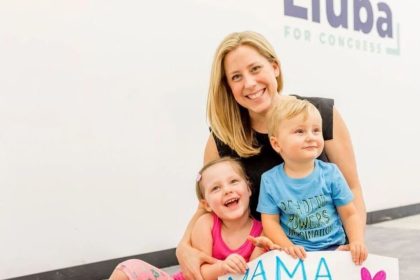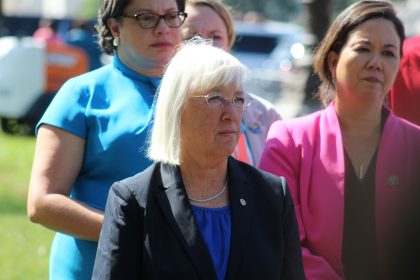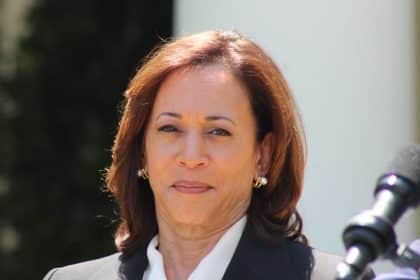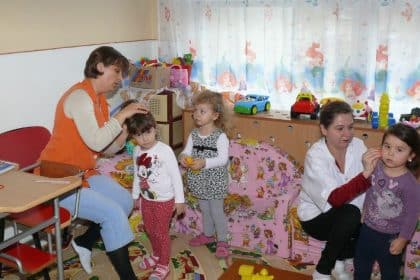Vice President Unveils Plan to Lower Child Care Costs

WASHINGTON — The Biden administration unveiled plans intended to lower the cost of child care for most Americans and strengthen the existing Child Care and Development Block Grant program.
In a call with reporters Tuesday morning, Vice President Kamala Harris announced a notice of proposed rulemaking that would cap child care copayments for families participating in the program at no more than 7% of a family’s income.
It would also encourage states to waive copayments for families at or below 150% of the federal poverty level.
“This is a critical issue for almost every family in our country — and … frankly, in too many places in our country, [child care] is just too expensive,” Harris said.
In addition, the new rules include provisions intended to improve the operation of the program by providing new incentives for child care providers to participate.
These include ensuring they are paid on time and based on program enrollment instead of attendance.
Finally, the initiative announced Tuesday will make it easier to access the program by encouraging states to accept online applications for enrollment and to make siblings of children who already receive the subsidy presumptively eligible for benefits.
According to Department of Health and Human Services estimates, the average family copayment for child care services increased nearly 20% between 2005 and 2021.
In April, President Joe Biden signed an executive order directing federal agencies to find ways to improve access to care and support caregivers and lower costs for families participating in the Child Care and Development Block Grant Program.
This grant program benefits more than 900,000 working families and 1.5 million children across our nation.
However, it has not been without its shortcomings. Despite the fact that HHS established 7% of family income as the federal benchmark of an affordable child care copayment in 2016, only 14 states have set copayment rates for families participating in the program at or below this level.
As a result, Harris noted, “many families [in the program] still pay hundreds of dollars every month out of pocket for care.”
The administration’s concern is that high copayments may push people out of the program, forcing them to patch together child care, reduce work hours or exit the workforce entirely.
In addition, research from the U.S. Census Bureau’s Survey of Income and Program Participation concluded that families with low incomes paid five times more for child care than families with higher incomes, as a portion of their incomes.
The change the administration is proposing could eliminate copayments entirely for many of these families and save a family of three more than $250 a month in Ohio, nearly $300 a month in North Carolina and over $350 in New Hampshire.
“What this would mean is,” Harris said, “is that a family in Montana making $46,000 a year could save about $80 every month, or over — almost over $1,000 a year.
“That money could go to gas and groceries or to fix a leak in their roof,” she said.
As for the changes intended to benefit child care providers, the vice president noted that families typically pay for child care prior to receiving services because providers need to cover expenses like payroll and rent.
“However, only eight states currently pay CCDBG child care providers in this manner,” she said. “Further, nearly one-third of states continue to pay CCDBG providers based on attendance as opposed to enrollment — meaning providers’ payments can be adjusted downward if children miss days.
The NPRM would stabilize operations for participating providers and encourage more providers to participate in CCDBG by ensuring that providers are paid prospectively instead of weeks after providing services to children and families.
Nearly 200,000 providers would start getting paid on time as opposed to retrospectively.
Additionally, the proposed rule would ensure that providers are paid based on program enrollment, giving providers needed financial stability.
Over 100,000 providers would start getting paid based on enrollment instead of attendance, offering providers reimbursements that are more stable.
“I strongly believe that when we lift up the status and the economic status of families, we lift up the economic status of communities. Our entire economy and our entire nation benefits as a result,” Harris said.
Later, she ended her remarks on a personal note.
“My mother had two goals in her life: to raise her two daughters and end breast cancer,” Harris said. “My mother was a breast cancer researcher, and she would work long days and often on weekends.
“And when she did, my sister and I would walk two doors down to the home of Mrs. Regina Shelton, the vice president continued. “Mrs. Shelton ran a child care center, and she became a second mother to my sister and me. My mother often said that but for Mrs. Shelton she would never have been able to do the work that she did. She would have never been able to contribute as she did to the fight to end breast cancer.
“Those are the stakes of this work: bringing child care to all families who need it. And that is why we must make sure all families can access the life-changing benefits of child care,” Harris said.
Dan can be reached at [email protected] and @DanMcCue
























